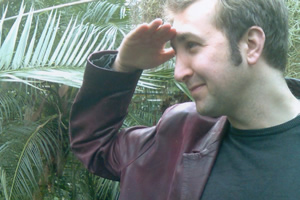Louis Paxton on bringing Calamity James to the screen for the BBC
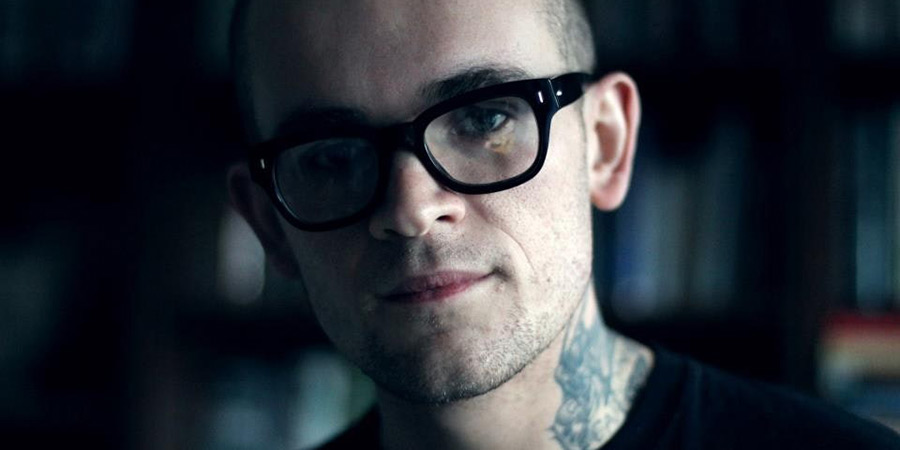
Louis Paxton is an upcoming, Edinburgh-based writer-director whose credits include the Broadcast Award-nominated BBC pilot Ladybaby and the Bafta Scotland-nominated short film comedy Neville Is Dead. About to start shooting the second series of BBC Three comedy-horror Wreck, he's just directed the BBC comedy short Calamity James, based on The Beano cartoon strip.
Starring newcomer Dylan Blore as the luckless James and Catastrophe and Guilt star Mark Bonnar as his ne'er-do-well father, the film opens in the maternity room as James is born, his father instantly dropping him, setting off a lifetime of calamitous events.
Here Paxton talks about making the first adaptation of a Beano character for adult audiences, the future of Ladybaby, his debut feature film and a serial killer comedy drama he's developing with BBC Studios that's essentially Jackass meets graverobbers Burke & Hare.
How did this Calamity James short come about?
I'd started working with Emanata Studios, the production company that owns the intellectual property of the Beano, the Dandy, Bunty, all of these publications going way back. They liked a script I'd written and decided they wanted to work with me. So they sent me a book with all of their IP, with the caveat that all of their big ones were already being developed, Dennis The Menace, Desperate Dan, Bananaman and the like.
But I was amazed at how many weird and wonderful characters and stories they had. Calamity James was one that stuck out, one I remembered from when I was young. It was very simple and very daft and he had a friend [Alexander] who was a lemming. An early draft I did involved that as well. It was quite heightened. But I also wondered how you would adapt that into a comedy drama for young adults? There was something about mental health to explore, someone who feels that they're cursed.
Originally, we pitched it as a series. But we didn't have a huge amount of luck with it. And then this BBC opportunity came up. At the BBC Comedy Festival in Newcastle last year, my short film Neville Is Dead opened a lot of doors for me and was used as an example by them on their website as the kind of thing they were after.
So I got in touch to ask if there was an opportunity for me to make something for BBC Comedy, I'd not done that as a writer-director at the time. They encouraged me to apply, so I sent a couple of ideas. Then Emanata came back, asking what do you think of Calamity James as a short film? I thought about it and realised it could work. We tweaked it a bit but tonally, it's quite similar to what we originally planned.
We honed in on this father-son dynamic. It's the first time I've worked with existing IP but Emanata were great. They gave me a lot of freedom to come up with characters and really good notes and development throughout. I've worked with Laura [Taylor], the producer, from the beginning on it and it's been lovely, a really good collaboration.
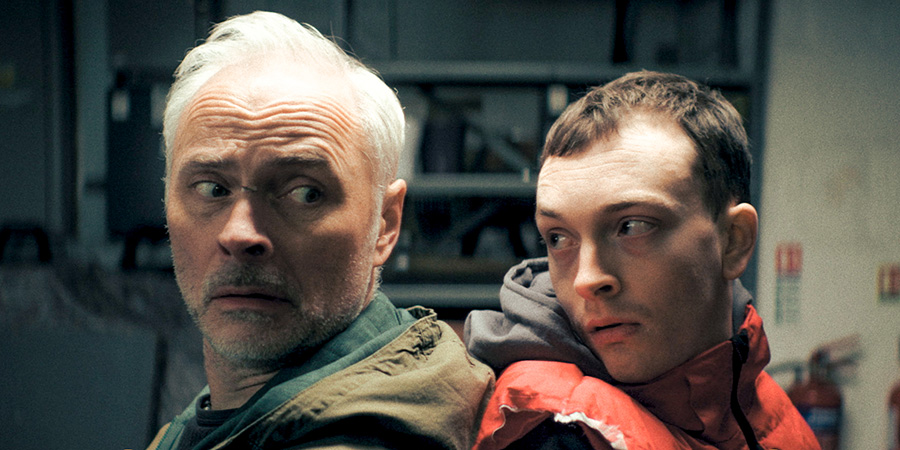
Did you feel pressure, given that not only is Calamity James a much-loved comic strip but you're flipping it to make it for adults?
Mark [Talbot], who runs Emanata, has a really clear vision for what he wants to do. Some projects might be more suited to kids. But I think generally he can see a way to adapt these characters and age everything up. I was encouraged to just go off and do what I wanted. A lot of people will know and love this character but he's not as universally beloved as Dennis The Menace. So there are fewer expectations and I didn't necessarily feel pressure. He's really simplistic. Every week he just gets into trouble and bumps his head on stuff, so beyond that I was given free rein to do what I wanted. Maybe I'm feeling more pressure now you're mentioning it, maybe I should have been more worried.
How did you arrive at the father-son relationship? After Ladybaby and Neville Is Dead, absent and chaotic parents appears to be a preoccupation for you.
Yeah, I realised over the last few years that it's definitely a big thing in my writing. I've got a feature film that I'm developing with Screen Scotland, a comedy. And again, it's about absent parents and the relationship between parents and their children as they get older. It's something I've always been interested in.
There's something universal about it. We can all relate to it. Whereas we can't necessarily relate to someone who just has chronic bad luck. There's something nostalgic about it too, it seems to be a theme I come back to again and again. My parents divorced when I was young but I have a good relationship with both of them. I don't have any of the trauma that the characters do but I can relate. The grief too. Neville was largely about grief and that is something I've experienced.
For me, comedies work best when you really care about the characters. And grief and strained relationships are a way into that. I also like an element of drama in its own right, that helps drive the narrative.
With Calamity James, we needed a relationship to ground it. Originally, he didn't have parents and he found himself taken under the wing of a kind of gangster who wanted to use his bad luck to seed chaos amongst his enemies. That was part of the series pitch. But when it came to making the short, that felt too big an idea. So the gangster became the father, this very low stakes kind of criminal who wanted to use his son to get back at this other criminal.
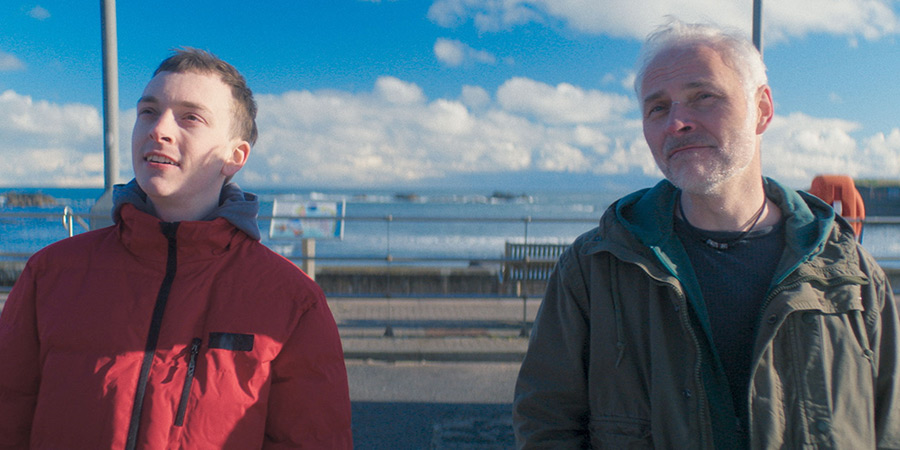
So is it a stand-alone short or a pilot for a series?
It was designed as a stand-alone and that was very much the brief from Jon Petrie [BBC director of comedy commissioning]. BBC Comedy said they didn't want to make pilots, they wanted to showcase new talent through shorts that had a beginning, a middle and an end, without the pressure to sell a series. And I appreciated that, because it's quite difficult sometimes making pilots when there's all that pressure on one episode. How many pilots have you watched that weren't as good as episode two, three or four in a series?
I can see why pilots exist. But it was great not to have that pressure. That said, we are talking about turning it into a series and I've an idea for how that would work. It's early days though. The reactions we've had have been really positive and I'm really proud of it. So I'd love to go back to that world and explore the characters more, there is more you could do with that tone. We wanted to set it in Scotland but we were keen not to set it in Glasgow or Edinburgh. So much stuff gets set there but Scotland has a wealth of locations. We wanted to go for a coastal town, so we created our own, although a lot of it was shot in East Lothian.
We wanted to create a place that was inspired a bit by Craggy Island or The League Of Gentlemen, where you could create your own world. It can be grotesque and you can play with it without offending an existing town. If we were to do a series, we would open the world up a little more. Like Lucky Len, who owns the local arcade and is a kind of shady criminal, if we got a series we'd broaden the scope of characters like that, find all these weird and wonderful types that we could flesh out. You can do anything because you don't have to show the castle in Edinburgh for example. So many great shows come from places where the writer gets to forge its identity.
The comic strip and the short have a fatalistic Scottish humour. When James gets struck by lightning, you're capturing the comic's cartoonishness. But it's also darker than that isn't it? When he alludes to his role in his grandmother's death and calls himself a "leper", it's really quite bleak.
If you look at all of my work, there's a little bit of that. The sweet spot, in terms of the stuff I love, but also the stuff I like to make, has a real darkness and dramatic truth to it. But it's very sweet at the same time, there's something optimistic. I like sentiment, I'm not cynical. But I don't like things that are overly sentimental and have no edge. So I try to balance both and that's quite a hard thing to do sometimes. I don't know if it's always successful but when you get it right, I love it, undercutting those heart-warming moments. Or having those heart-warming moments when you've just seen something really cynical, it's unexpected.
And yes, I suppose we Scots have a gallows humour. But I think a lot of the UK does. There's definitely a miserabilism. I like the balance of heart and darkness.
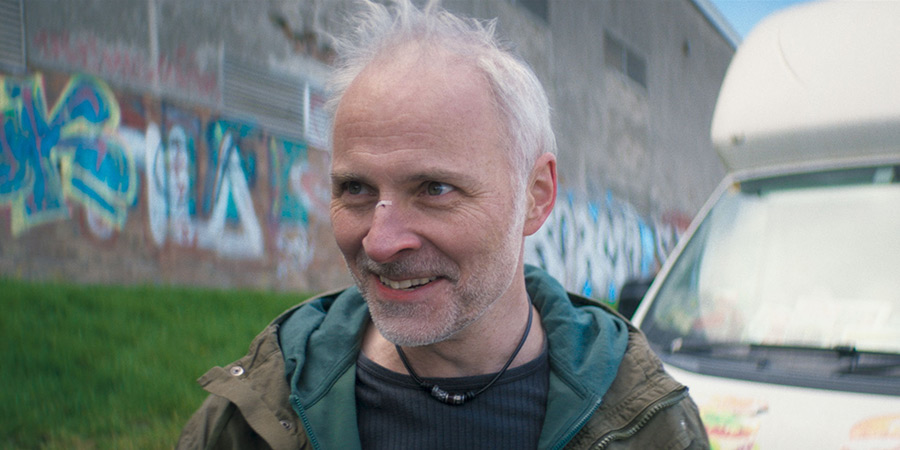
What was it like working with Mark? He portrays likeable arseholes very well.
He was the first person we wanted for it and I kind of had him in mind. I've always admired him. The thing with Mark is, he often gets cast in very hardened Scottish roles. And he's brilliant at that. But he's also immensely charming. I said to him, "you've got a real Jack Nicholson thing", an edge, like a sharky thing to him, which is great to watch.
This character is supposed to be charming, he wasn't supposed to be a monster. He's a very flawed character, he abandoned his child when he was young, he's been on the wrong side of the law for a lot of his life. So it was very important he was likeable. It's like he's coasting through life on his smile and Mark felt perfect for that. He's an astounding actor but also an incredible comedian, he just comes up with stuff. That's my favourite kind of performer to work with, someone who elevates everything that's in the script already. So he was dream casting. But then we got him and it was really validating that he liked the writing.
Dylan's a younger actor, up and coming, he really rose to the challenge. Both of them were really open and creative, which made it a lovely experience. Because it was a three-day shoot, really tight for the amount of locations and quite complex action that we had going on. It wasn't a bunch of people in a room having a conversation. I've had more time to shoot films with less budget. Mark and Dylan just made it really, really easy and straightforward.
Were you involved in casting Dylan? What were you looking for?
We looked at the character and thought 'well, if he's been cursed with bad luck and he's contagious, he'd be very socially awkward' because people would either reject him constantly or he would feel he didn't want to be around them. But we wanted that balanced with a warmth and sort of optimism. And honestly, loads of great people auditioned. But Dylan just had a real innocence and charm and was just really funny in his audition too. He delivered so much prior to the callbacks and responded to them really well. And there was something about him and Mark together, their energies. I really like the dynamic of it. Mark drives so much of it from scene to scene and Dylan had to go from being accepting and quite naïve to really challenging his dad. And he had that from the first audition.
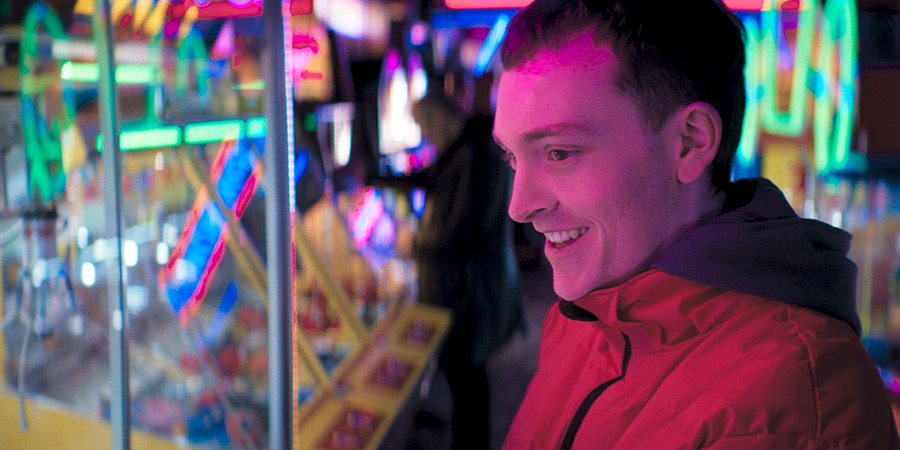
We understand that you got into making comedy by trying to shoot Jackass-style videos with your mates. Do you want to keep making television or is your ultimate ambition to make films?
I was raised on both. I obsessively watched TV comedy and films. But I trained as a film director, very classic cinema and that's affected a lot. I've always dreamed of directing movies. But over the last 10, 15 years, it's become hard to ignore just how cinematic TV can be, how advanced the storytelling has become. I think I make my strongest work when I write and direct and the scope of what you get to play with, six half-hour episodes, that's such a lot. So at the moment I'm focused on writing and directing TV comedy.
But I also have that feature in development, a project I've been working on for a long time. It's a comedy, very tonally in keeping with Neville Is Dead and Calamity James. It's gone very well with the funding for that. But television is much quicker, the process of getting something greenlit, as well as being less precarious from the money side of things. I'd love to write and direct a TV comedy series. That's my primary aim.
The film's called The Incomer isn't it? Based on stories you heard growing up and set on an island. Can you tell us more about it?
Part of my family is from Orkney and we've been going there since we were really, really young. So it's a big part of my childhood landscape. And years ago, we went to this island called Swona, in the Pentland Firth, which was abandoned in the 1970s. And it was just really evocative, like the Mary Celeste. Tables still set, you know, a very different way of life. And I read about the brother and sister who used to live there, James and Violet Rosie, and was just really inspired by them. Because they lived such an isolated life but they were still in the UK. That's the jumping off point but the story I'm telling is miles removed from that.
It's a comedy and I was really inspired by Hunt For The Wilderpeople tonally and also something like Stepbrothers. I want to make a really broad comedy but with a real indie sensibility. A brother and sister live on this island in the middle of the North Sea. And suddenly this incomer comes from the council and tells them that they have to leave. It's just a three-hander but it's quite heightened. The characters have lived there for a long time, their parents went missing when they were young. And it's quite warped. They speak to these fantastical, folkloric creatures. They have this whole rich history they've invented. Again, it's about grief and parents.
So, it's like Hunt For The Wilderpeople, in that it's them against the world?
What that film did really well was the real drive to the narrative, the adventure story at the centre of it. So in The Incomer, there's this ticking time bomb, the council are going to come and remove them from the island. It's a real adventure, it's fun, a family movie. But it's dark too, I grew up on Tim Burton stuff like Beetlejuice and Edward Scissorhands. Family movies but with an edge to them.
I want it to be Scottish but I want it to be really universal too. It fits in with a lot of what I've done already but I want to be ambitious with it. It's a long process, I've been working on it for quite a few years now. When I get TV work, I have to drop everything and then go back to it later.
But you've got the funding for it?
We've partially got the funding. We've got Screen Scotland production funding and now we're looking to raise the rest. It takes so long to get the money together that when you get a bit, you're like oh, great, this feels positive. It's hard at the moment to fund films and it's particularly hard to fund comedy. Which is funny because everyone we speak to says we love comedy and we want more. It feels like there's a real hunger for it. And there are great examples of comedies that have done well lately. Rye Lane. But I only understand the world of feature film funding a bit. Thankfully, I've got producers who understand it. TV is a bit more straightforward.
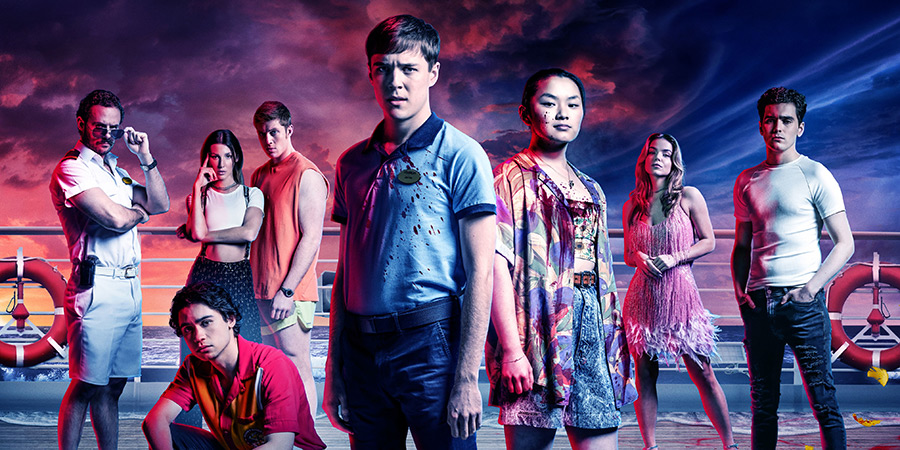
You must have spent quite a bit of lockdown writing to have so many projects in development. What's it like arriving on someone else's project, like Wreck, where you're a director-for-hire? You're clearly comfortable with horror-comedy.
We're in prep for that. The first block is shooting in Belfast at the moment and I'll be shooting mine in about, five, six weeks. I'm directing Episodes 3-6 of the second series. It's great, it's what I trained for. I only got into writing after I graduated from my master's degree [at the National Film and Television School in London] and struggled to get work because it's really, really competitive. I graduated with a comedy musical [Musical Star!] which I don't think was the easiest thing for producers and development people to get on board with, to see me as a director, because it was so heightened.
But directing without having written is really freeing. Being a writer or a director on a show like this is a massive job in of itself. I learned a lot from making [BBC One's] Shetland, which was miles different from anything I've done, that was Scandi-noirish crime drama. And I'm learning making Wreck. I love genre film generally but horror in particular. My references when pitching for it were Sam Raimi and 1980s slasher pics and gore.
So it's great that everyone involved is really into that. Ryan [J Brown] the writer is a massive horror nut, so we chat about it all the time. There's a lot to shoot because every episode has big kills in it and there's pressure to up the scale of what you're doing and keep it interesting, not rest on your laurels. The crew in Belfast are amazing, quite similar to how they are in Scotland. It's a small industry but they're really, really talented people.
Is anything happening with Ladybaby? Because it was nominated for best comedy in the Broadcast Awards, a pilot up against acclaimed shows like Ghosts, Starstruck, We Are Lady Parts and Alma's Not Normal.
I've not heard anything. It's [writer] Kirstie [Swain]'s baby. She and the executive producer Phil Temple worked on it for quite a while but he's not with Kudos [Productions] anymore. So I don't know. Kirstie's very busy working on Sweetpea with Sky.
Also, we came out at a time when there was a real move away from comedy drama towards comedy-comedy, the kind of comedy that isn't heavily serialised. Ladybaby is unashamedly comedy drama, trying to pack as much heart in. I still think we got a lot of laughs in there as well. But it's a real shame. I've read Kirstie's outline for the series, the way she was going to take it is brilliant and it would have been really, really funny. And we got a really good cast together on the strength of it [Amy Manson, Mirren Mack, Phyllis Logan, Ford Kiernan, Richard Gadd, Grant O'Rourke, Samuel Anderson] you can do that with a really good script. It was my first TV gig as a director and everyone was so supportive because I was quite untested.
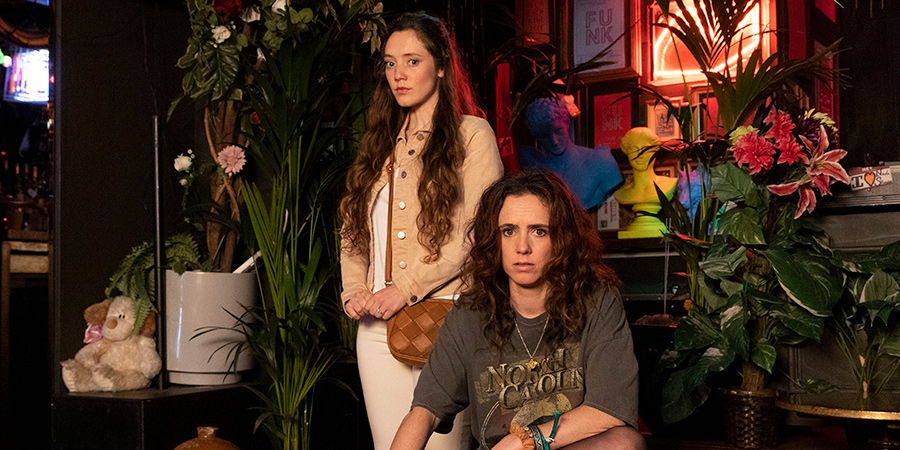
We understand you were in a writers' room for an adaptation of The Bash Street Kids for Emanata. How did you find that process?
I love the idea of writers' rooms. I wasn't the lead writer on it, I was brought in for two days and it was all Scottish writers. We just talked really broadly on Zoom.
But I know people who've done them in person and have always wanted to do them, I think we should be doing more of it. In the UK we have this playwright mentality, of revering people who can write the whole thing themselves. But there's a reason they have so many great shows in the US, the joke rate they have and the really tight storytelling. We just don't have the budgets for those massive rooms. But if I ever get to be a showrunner, I would absolutely do a writers' room. I'd want other writers to contribute because how could it not improve it? And at a base level, I just love sitting and talking about ideas.
What can you tell us about The Big Man, the pilot you've written for BBC Studios?
Someone in the industry challenged me to write drama. I told them that I don't know if it's something I could do, so they said, what if you did it your way? I thought about dramatic stuff. And I really like gothic, serial killer crime. Silence Of The Lambs, True Detective.
And there was this story in Edinburgh, 50, 60 years ago, about a bunch of kids who found this cave, it was on Arthur's Seat I think. And there were all these mummified little dolls or what they thought were dolls. They were kicking them around. Then one of their teachers found them and realised they were actually mummified children. They reckon it was something left over from like Burke & Hare, the body snatchers. Dark right?
But I thought there's something in these kids who didn't know what they were doing, a way into a story. My friends and I growing up in Edinburgh, we were in the hills all the time, we had quite a lot of freedom. If we'd found something good, how would we have dealt with it? So the show is about these kids who find this body. And then the tone goes mental. It turns out there's a serial killer. It's all set in the Highlands and everything kicks off as these kids start their own true crime documentary on YouTube.
It's partly because they used to do videos of throwing themselves off things, inspired by my upbringing of being into Jackass. There's an official investigation but their investigation is going on as well. It's very comedic but it's totally the structure of crime drama. I just watched a load of them, that was my lockdown project. If it didn't have the comedy it might be quite generic. There are a lot of crime thrillers out there, you're always up against that. But I think the younger characters make it quite different.
BBC Studios are pitching that around. No-one's bitten yet but it's served me really well, it's got me a lot of other work as a spec script. It's definitely the most ambitious project I've got at the moment. We'll see what happens.
So what's next for you?
Well, shooting Wreck, then a couple of script commissions. And then hopefully The Incomer. If that gets away, I'll jump on that.
This article is provided for free as part of BCG Pro.
Subscribe now for exclusive features, insight, learning materials, opportunities and other tools for the British comedy industry.

